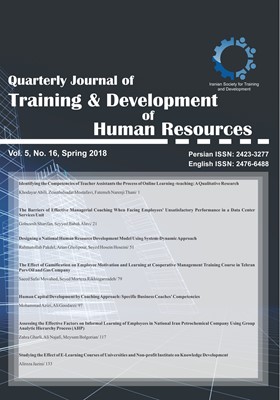The Effect of Gamification on Employee Motivation and Learning at Cooperative Management Training Course in Tehran Pars Oil and Gas Company
Subject Areas :
Saeed Safaei Movahed
1
![]() ,
Seyed Morteza Rikhtegarzadeh
2
,
Seyed Morteza Rikhtegarzadeh
2
1 - شرکت نفت
2 -
Keywords: Gamification, Motivation, Learning, Training, Pars Oil and Gas Company.,
Abstract :
The purpose of present study was to notice the effect of gamification on employee motivation and learning at cooperative management training course in Tehran Pars Oil and Gas Company by quasi-experimental method of Pre-test and post-test design with control group. The statistical population consists of all Pars Oil and Gas Company employees (700 people), which according to John Kerrosol's opinion, 36 were considered through simple random sampling in two experimental groups (18 persons) and control (18 persons). The instrument used in this research was a researcher-made questionnaire designed to measure learning motivation with 20 items in a 7-degree scale. The other instrument is an explanatory teacher-made questionnaire composed of 9 questions. The formal validity of a number of participants in the research and content was confirmed by the supervisor and several experts, and its reliability was confirmed using the Cronbach's alpha for learning motivation questionnaire by acceptable 0.832 value. To analyze the data, descriptive statistic including mean and standard qualification as well as inferential statistics including ANCOVA and MANCOVA covariance were used. The findings showed that the application of the gamification method to motivate and learn employees in Pars Oil & Gas Co. is effective.
1. Long L.K, Smith R.D. The role of Web-based distance learning in HR development. Journal of Management Development. 2004; 23: 270-284.
2. Jennings M.E. Key Factors Associated with the Development of Performance and Efficacy. Thesis for Doctor, University of Connecticut. 2007.
3. Huang Z. A compilation research of ERP implementation critical success factors. Issues in Information Systems. 2012; 11: 507-512.
4. FathiVajargah, C. Planning training of Staff development. Tehran: Publication samt; 2010.
5. Griffin R. Moorhead G. Organizational Behavior (New Edit). Translation by Mehdi Alvani and Gholamreza Memarzadeh, Tehran: Pearl Publications. 2012.
6. Brough J.E, Schwartz M, Gupta S.K, Anand D.K, Kavetsky R, Pettersen R. Towards the development of a virtual environment-based training system for mechanical assembly operations. Virtual Reality. 2007; 11: 189-206.
7. Orosco J.S. Examination of gamification: Understanding performance as it relates to motivation and engagement (Doctoral dissertation, colorado technical university). 2014.
8. Velayati E, Ramezani S. Guidelines for teachers' use of educational games. Journal of Educational Technology Development. 2011; 217(1): 7-9.
9. Werbach K, Hunter D. For the win: How game thinking can revolutionize your business. Wharton Digital Press. 2012.
10. Kapp k.m. The Gamification or learning and Instruction. ISBN: 2014; 978.
11. Hamari J, Koivisto J, Sarsa H. Does gamification work? --a literature review of empirical studies on gamification. In System Sciences (HICSS), 47th Hawaii International Conference. IEEE. 2014: 3025-3034.
12. Creswell J. W. Educational Research Planning, Conducting, and Evaluating Quantitative and Qualitative Research. 2012; 13: 978-0-13-136739-5.
13. AhmadiSiyahBomi A.K, Salehi K. The Effectiveness of Two Methods of playing and Traditional on Math Achievement in Third year old primary School Students. International Conference on Humanities, Psychology and Social Sciences, Tehran: Institute of Managers of Idea Capital, Ilya. 2015; 1: 7.
14. Azizi H, Norouzi D, Zavaraki E. The Effect of Teaching Method Busby on Students' Learning Academic Achievement Motivation. Two Quarterly Journal of Cognitive Learning Strategies in Learning. 2014; 5(5): 39-55.
15. Shakor M, Haqqani F, Shokri T, Bahramian H. Effect of game teaching method on student satisfaction and their academic achievement in anatomy lesson. Journal of Isfahan Medical Callege. 2013; 163: 1038-1047.
16. Salehpour M. A Comparison Study of the Effect of Two Teaching Me Methods Of playing and Traditional on Students' Motivation and Academic Achievement. Master's Degree, Tarbiat Modares University. 2011; 100.
17. Kheirkhahzadeh A.S, Sauer Ch, Fotaris P. Practice Makes Perfect-Gamification of a competitive Learning Experience. 2015; https://www.researchgate.net/
18. Poyamanesh J, Ramezani, R. (1390). Study the Effect of the Game on the amount of primary school math learning. Journal of Knowledge, 2011; 20(163): 174-167.
19. Clarke S, Lameras P, Arnab S. SimAULA: Creating Higher-level Gamification Though Adoption of a Learning-Objective to Game-Objective Mapping Approach. 2016.


